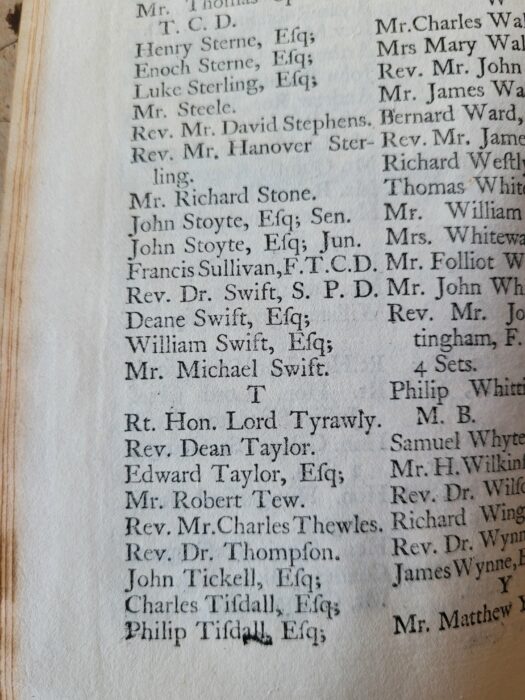The Non-Writing Part of Writing
By Dave King | April 20, 2021 |
 One of my favorite vintage bookstore finds is two volumes (out of three) of a 1742 translation by Rev. Philip Francis of the complete works of Horace. It’s interesting not so much for the translations (Francis turns Horace’s simplicity into contrived eighteenth-century rhyming heroic couplets) but for the technique Francis used to get it published. At the beginning is a list of subscribers – famous and/or rich people who paid a fee to be publicly seen as supporting the author. Among the viscounts and bishops is one “Deane Swift, Esq.” That would be Jonathan Swift, of Gulliver’s Travels.
One of my favorite vintage bookstore finds is two volumes (out of three) of a 1742 translation by Rev. Philip Francis of the complete works of Horace. It’s interesting not so much for the translations (Francis turns Horace’s simplicity into contrived eighteenth-century rhyming heroic couplets) but for the technique Francis used to get it published. At the beginning is a list of subscribers – famous and/or rich people who paid a fee to be publicly seen as supporting the author. Among the viscounts and bishops is one “Deane Swift, Esq.” That would be Jonathan Swift, of Gulliver’s Travels.
Of course, writers today don’t have to persuade subscribers to pay for publication, selling their work on the same model that PBS uses to fund Masterpiece Theater. But from what I’ve seen of my clients’ experiences, being a successful writer nowadays involves a lot of skills that have nothing to do with actual writing.
Editing, for instance. This comes in roughly two different flavors – conceptual editing, which critiques how well your plot and characters work, and copy editing, which deals more with correct spelling and usage. (Full disclosure, conceptual editing is what I do for a living.) A lot of writers hire this out, especially the conceptual part, since it’s all but impossible to fairly critique your own work.
But good editing can be pricy, and many beginning writers on limited budgets have to learn to do it for themselves. There are <ahem> a lot of good books on what to watch for as you rewrite. Critique groups, where writers trade critiques on one another’s manuscripts, can be a help. But editing, especially copy editing, is a very different skill from writing, and it’s one you may have to teach yourself.
You’ve also got to learn some of the basics of book design. Even most self-published writers will hire this out, since it is best done by professionals. But you’ve still got to know what makes a book design function in order to judge the work the professionals are doing for you. I’ve frequently had clients send me published books adorned with cover art that looks like it could have come from the notebook of a relatively talented high school junior and pages of too-small print with narrow margins that made the text almost undreadable.
Once you’ve got the manuscript together and the book designed, it’s time to teach yourself marketing. Even if you have a string of successes and a major contract from a large publishing house, you still have to spend a fair amount of time on the road, on book tours, readings, and signings. And that’s if you’re lucky. If you’ve been published by a small publishing house with limited resources or self-published, you might have to not only go out for book signings but arrange them yourself.
This means learning how to spot and connect with markets, how to get the most bang for your advertising buck. It means building a relationship with bookstores who will feature your book and perhaps host a book signing. One client who lives in the Boston area and writes noir crime has a good relationship with several local bookstores that specialize in the genre. Another writer I know, who writes mysteries centered around a knitting club, arranged to have her book sold in yarn stores.
You can always hire out your marketing, of course, bringing in a professional publicist to guide you past the pitfalls and help you find your market. This still means you have to commit time and money to the project, but it might be easier than learning a new profession on top of writing.
Choosing and entering contests are another needed skill, since placing a story in a well-respected anthology volume can boost sales and recognition. A caveat here – there are plenty of contests that prey on a writer’s need for recognition. I know from several clients’ experiences that these contests usually involve little prestige and always involve an entrance fee – the equivalent of offers I used to get to be included in Who’s Who among American Literary Professionals. I had a chance to order my own personal copy for only $69.95.
The better contests are those sponsored by longstanding literary clubs or magazines, like the Mystery Writers of America Anthony Awards or the Romance Writers of America Golden Heart contest. If a contest’s past anthology volumes contain well-known writers, and they don’t require a substantial entrance fee, then you’re probably safe.
A lot of writers try to build an internet presence, either to help sell their self-published works or to build a platform that will make them more attractive to mainstream publishers. I’ve had at least two clients who have started blogs about their chosen genre, to try to get their name out to fans. They quickly found that promoting a blog is every bit as much work as promoting a book. Both build their readership slowly, and a blog requires frequent updating to keep readers interested. So, I’d recommend against it unless writing your blog is a labor of love.
If you’ve just put the finishing touches on the final draft of your new novel, you may want to prepare yourself. You may have finished the job of writing. But now it’s time to begin the job of being a writer.
So how have you dealt with the non-writing aspects of being a writer? Are there any I’ve missed?
[coffee]










One element that you missed is the ecosystem of advertising for Indie published books. There’s an entire cottage industry of people who sell courses and books about how to sell Indie published books. Amazon is now a pay-to-play marketplace where you are pretty much forced to spend some money on advertising if you want to be seen. It doesn’t have to be a lot of money if you can write to market and then advertise to that market. (Note: Write to market means knowing your genre and readers, not chasing trends.) The three main advertising channels for Indie publishers are Amazon itself, Bookbub, and Facebook. Each has its own quirks that you should understand before spending money there.
Thank you, Tom.
There is doubtless a lot to be written about that ecosystem of adverpublishing, but I’m not the one to do it. All of my experience on the topic comes from what I’ve learned from clients.
Perhaps you could pitch something to Therese or Kim.
Seems to me you’ve covered the main bases!
Remember back in the late 2000’s when everyone had five thousand different social media accounts and a blog to boot? All the blog challenges and camaraderie was certainly heady stuff, but it did take a lot of time to manage it all. My own devolved into mostly sharing funny photos from I Haz Cheeseburger. I still have it, unused and neglected, and have tried to revive it a couple of times (last attempt in Oct 2019 with a fun post about reframing writer negative thinking), but sadly I seem to have even less time in the day now than back then. I also don’t see people really visiting regular blogs anymore. I can’t bring myself to delete it, though. It’s another thing I’m procrastinating on making a decision about. :)
I maintain my own blog as part of my website, where I repost the article that appear here. I haven’t updated it in more than a year, mostly because other things seem to take precedence.
It does take a lot of dedication and work, even when it’s a labor of love.
You haven’t missed much here, Dave. I’m doing another round of line-edits on my Ms., querying, researching comps, agents, and imprints, reading in my genre and longing to dig in to revising my second book. In the SM (didn’t that used to stand for something else?) realm, I’m most at ease with Instagram. But I feel like I’m always in a learning curve and living outside my comfort zone. That’s a good thing, I suppose. I’ve also begun a file labeled ‘resources’ in which I put lists of anything and everything that comes into the orbit of finishing, polishing and selling a novel. I’ve learned more about the industry in the past year than I did in the last twenty. Also a good thing. But I need to get better at resting. Working on that.
That’s exactly what I’m talking about. In fact, I wrote this article partly as a warning for beginners so they understand what to expect when they get into the profession of writing.
I understand this isn’t simply limited to writing. Musicians often have to handle their own bookings and tours when they’re first starting out. Artists have to set up their own showings.
Of course, was it ever different? Frances had to dun Deane Swift for support for the Horace volumes, and Cellini in his autobiography has choice things to say about the patronage system.
I re-discovered how much I enjoy the whole process of making books when I self-published my first novel, BOUND. I hired out design and copyediting, but am learning those skills as well. I fail miserably at the marketing part because my focus still remains on craft of writing. Maybe someday, there’ll be enough $$$ to hire it out as well. Definitely lots of hats to wear when you make books, but I’m so happy to be doing it. It is both a gift to myself and to others.
When my kids were little, we ordered blank books from barebooks.com and made one of a kind books. Such fun.
But I forgot to say how much I appreciate having an entire team behind me with trade books.
Same here! My husband does the copyediting and I hire out the cover design, but everything else I do myself – with the help of beta readers at the conceptual editing stage.
And marketing really isn’t my forte. It doesn’t help that in New Zealand culture anything that looks like self-promotion is regarded with the deepest disapproval and/or suspicion. As the Maori saying goes, “the kumara does not say how sweet he is.”
Whoops! Correction: I hire out the cover typography.
This is the kind of labor of love I was talking about. And I can understand falling in love with the physicality of books. One of the things I enjoy about antiquarian books is their physical presence, their history, their individual character. I can see how that might attract you.
No matter their financial status, all independent writers should budget for an editor – both technical and conceptual. It’s absolutely necessary to produce a quality product and is merely the cost of doing business. I was fortunate to contract an editor who did a comprehensive job for my first, self-published novel. Of course, I had to research her credentials and talk with her on the phone before hiring her. But it was worth the time, effort and money.
As for the marketing part of writing, that’s where I falter. I’m just not a salesman, but I feel confident enough in my writing to set aside my qualms about it. Again, that’s just a necessary part of the overall task.